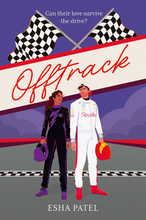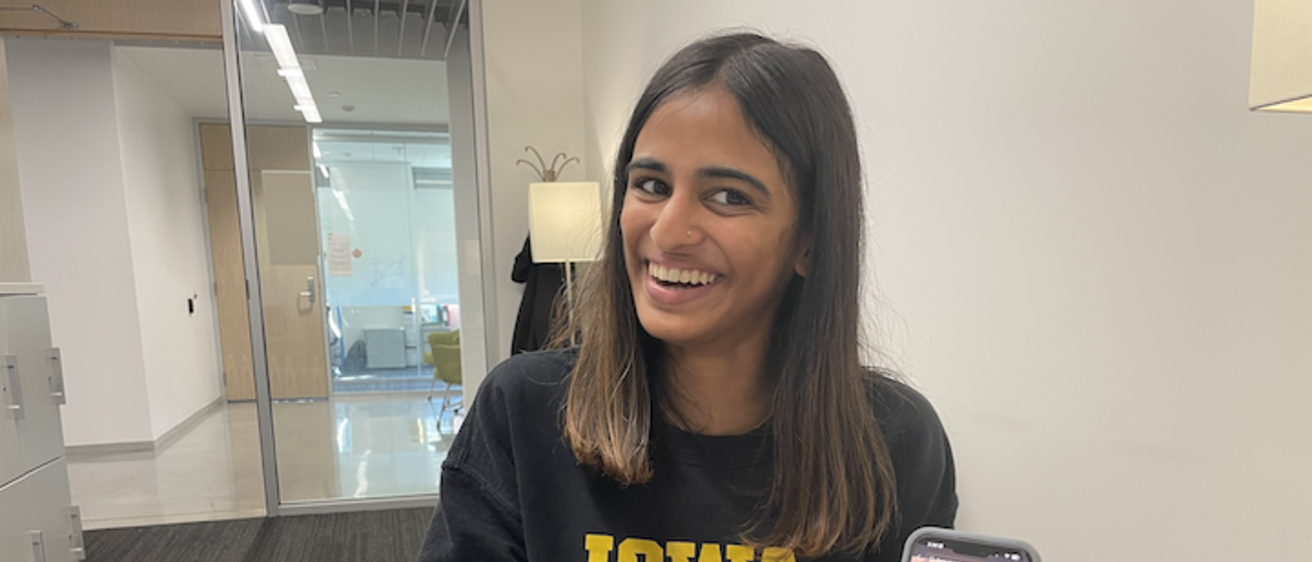Whether she’s helping the Health, Brain & Cognition Lab investigate how lifestyle choices affect brain health or delving into the motivations of Formula 1 racing drivers for her latest novel, “digging into things to find out root cause” is a satisfying pursuit for University of Iowa third-year psychology major and pre-med student Esha Patel.
“They are very different kinds of research. The intersectionality is hard to describe,” says Esha, who has self-published four online novels via Amazon, and this year landed her first traditional book publishing contract with the United Kingdom arm of Harper Collins.
Racing setting nabs editor’s eye

Esha first tried her hand at writing a story book during her middle school days in Chicago’s western suburbs, but she didn’t attempt a full-length novel until the pandemic confinement of 2019-2020. She finished her first romance novel, “Florida’s Finest,” with a plot centered on the personality clash between loud-mouthed, unconventionally daring firefighter Camile Soledad Perez and her hated boss, Miami Fire Station Captain Antonio Reyes in the summer of 2020.
“I wanted to share my work with my family, so I started self-publishing,” says Esha, admitting to “a huge obsession” with TV dramas like 9-1-1, Lonestar and Grey’s Anatomy. After another fire-rescue novel and a pair of books set in emergency rooms, she shifted gears to the international world of Formula 1 racing in her fifth book, “Offtrack,” a setting that caught the attention of a Harper Collins editor looking for fiction in the Formula 1 genre. Esha’s skills at social media promotion were key.
“One of reasons it got picked up was TikTok,” she says. “For some reason, the video went viral and got 50,000 likes or something. That’s where the editor saw it.
The book contract called for a major structural overhaul, then a line by line edit before going to a copy editor. Esha spent spring break in her room completing the rewrite. “I love my editor but going over and over is most painful part. I’m thankful to have people who can help with that,” she says.
“To see Esha's career as a fiction writer thrive on top of her accomplishments as a student, volunteer, and research assistant is really exciting and inspires us all to keep an eye on our 'what if' wish lists."
— Heath, Brain & Cognition Lab Director Michelle Voss
Esha describes “Offtrack” as “a mix of drama and racing politics, the Drive to Survive Netflix series with romance.” The novel is fast-paced, featuring college-aged and young middle-aged characters, including Formula 1’s first woman driver in decades, giving “female fans a space to enjoy the sport.”
“Most of my research is second hand,” says Esha. “It’s a hard sport to break into as a fan.” There are only three Formula 1 races in the United States, and all are expensive to attend so she has not been to a race in person. “I’ve watched videos, listened to people who have worked in the sport and got to know a couple of readers who had ties or friends of family who are close to the sport.”
Esha says she is committed to writing diverse books with diverse cast of characters. In “Offtrack,” the main female character is Middle Eastern. Her sequel, “Overdrive,” featuring a Brazilian American male main character and Indo Guyanese female main character, hit U.K. shelves in November.
She drew on her own background as the daughter of two immigrants from India and help from an Indo Guyanese reader in her research. “I found a lot of elements in Indo Guyanese culture are similar to Indian. A lot of language is lost, but how you see your family is similar. It was interesting to see what had changed with different foods, dances and twists on Indian culture,” Esha says.
Released in paperback last May in the U.K., “Offtrack” has sold around 10,000 copies. “My U.K. friends say it’s in Waterstone, the Barnes & Noble of the U.K. It’s doing pretty good,” says Esha. “It’s crazy to think a little over a year ago I was still self-published.”
The printed book is also available in the United States. “I don’t know how many we’ve sold here,” says Esha, who has done signings in Marion, Coralville and Iowa City bookstores. She enjoys meeting readers, along with other aspects of the book publishing business, including choosing narrators for audio publication. “The audio book narrator for ‘Overdrive’ was on ‘Game of Thrones.’ The networking that happens in the literary world is so crazy. I would not have dreamt of that.”
Fiction writing both challenge and escape
Managing a writing career and a full-time academic load is a challenge. “I try to fit it in,” she says. “I set a word count, say 1,000 words tonight, or I sit down and write for 30 minutes. Maybe I do 1,500. Some days I’m sitting here staring at this blank screen.”
Research and writing can also be a welcome escape. “Once you do so much hard, hard sciences, like chemistry classes, it’s nice to step away. I’m able to explore some aspects of psychology. I also talk about mental health and physical health, things that are interesting to me.”
Esha says her interest in psychology comes via her mother, a psych major who became a drug and alcohol counselor. “I was exposed to the field at a young age,” she says. “I started reading up on that stuff. I felt like I might want to do this in school, combine mind with medicine, treat the whole person.”
She joined the HBC Lab team as an undergraduate research assistant while taking Lab Director Michelle Voss’s research methods class. Esha says a summer job as a Certified Nursing Assistant in a memory care unit opened her eyes to the toll of dementia on elderly residents and makes the HBC Lab’s research focus “meaningful.”
“To see Esha's career as a fiction writer thrive on top of her accomplishments as a student, volunteer, and research assistant is really exciting and inspires us all to keep an eye on our 'what if' wish lists,” says Michelle.
Esha’s most recent lab assignment is coding mazes and side tasks on a computer for study participants. She has also helped participants take computerized pre-tests before starting interventions. “It’s interesting to see the patterns that emerge as they go through testing,” she says. “It’s a different side than caring for dementia patients.”
She believes her lab experience and psychological training will serve her well treating patients’ bodies and minds when the time comes to practice medicine. She’ll continue to make time for novel-writing as well. “It could be a long-term thing,” she says.
With years of medical school ahead, Esha is grateful that her writing hobby is generating income. “College is expensive,” she says. “It’s good to put some of that away.”
Emery Styron
